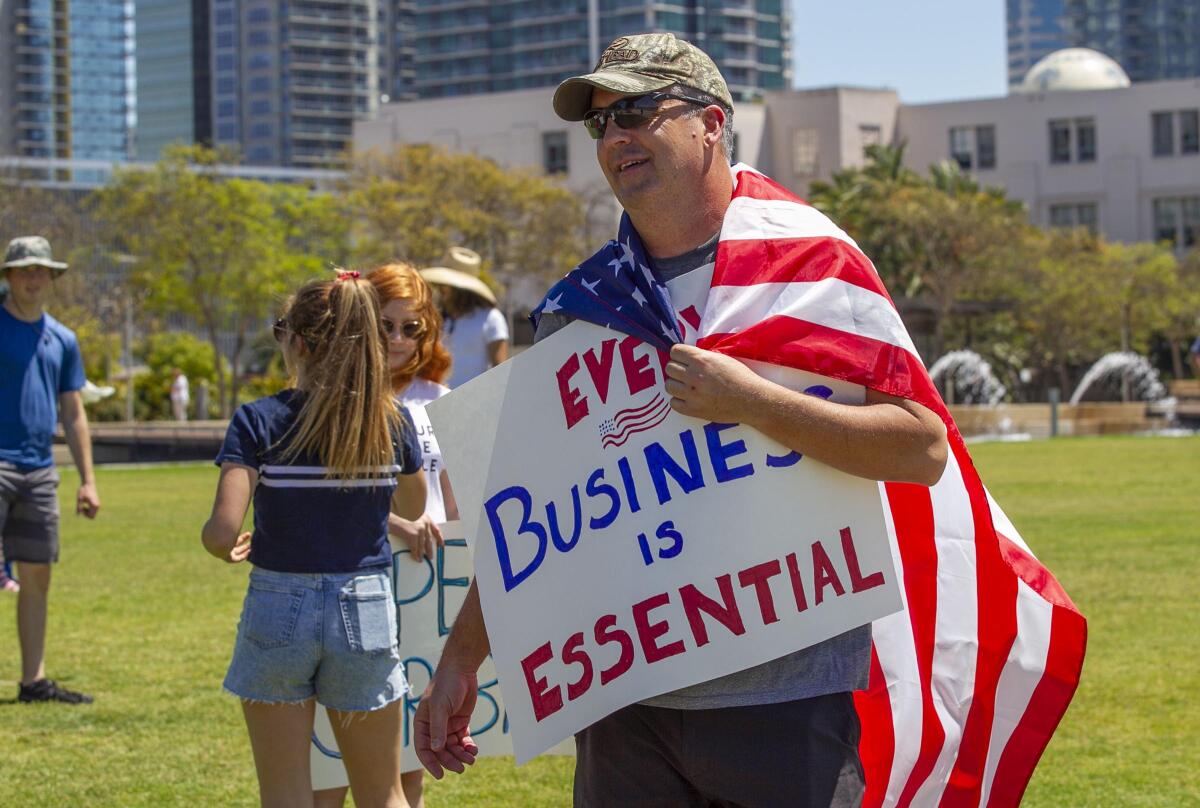Op-Ed: Yes, businesses have been hurt by coronavirus closures, but they won’t get relief from the courts

In California, seven small businesses have sued Gov. Gavin Newsom, Mayor Eric Garcetti and others, arguing that closure orders for nonessential businesses are unconstitutional. In Pennsylvania, a group of small businesses has filed a petition seeking U.S. Supreme Court review of lower court decisions that upheld the governor’s closure order there.
The frustration of the business owners is understandable. They have suffered enormously from closure orders, and many may never recover. But the law is not on their side.
Since 1937, the Supreme Court has held that government regulation of business is allowed so long as it is reasonable. Indeed, not once in the last 83 years has the court ruled that any government regulation affecting businesses constituted an unconstitutional deprivation of property without due process of law. Time and again, the court has made clear that regulation of business is left to the political process, even when government decisions cause serious harm.
Even in usual times, judicial deference to the government’s ability to regulate the economy is enormous, and it will be even greater in the context of a pandemic. The Supreme Court has held that restrictions of civil liberties are allowed to limit the spread of a communicable disease, so long as there is a real and substantial relationship to public health. This is why quarantine orders are constitutional, even though they greatly restrict freedom.
The closure of nonessential businesses, along with shelter-in-place orders, were clearly designed to limit the spread of COVID-19, since the danger of virus transmission rises the more people interact with one another.
Nor are businesses likely to succeed in arguing that the closure orders violate a constitutional provision that bars the government from taking private property for public use without just compensation. Here, too, courts have been very deferential to the need for government regulation.
Most relevant, the court has said the government can temporarily deprive people of the use of their property, so long as the action is reasonable. For example, in 2002, the Supreme Court upheld a 32-month moratorium on development of property in Lake Tahoe, even though it imposed great financial costs on the owners. The government prevented development during this time for the purpose of conducting an environmental study. The court found that the government’s action was reasonable, and it therefore owed no compensation to property owners despite their significant economic losses.
More generally, the court has said that the government can regulate property to prevent a “nuisance” and to protect public health and safety so long as its action is, on balance, desirable. A century ago, for example, the court upheld the government’s right to order the destruction of trees without just compensation in order to prevent the spread of a highly infectious plant disease.
And in emergencies, the court has found, even property may be taken without need to pay just compensation. In 1952, the court concluded that the government did not need to reimburse a company for having destroyed its oil facilities in the Philippines to prevent their takeover by the Japanese during World War II.
The courts have made clear again and again that the government can regulate businesses to serve the public interest, even when the regulations it imposes result in great economic losses or even force the closure of businesses. The alternative would be to dramatically limit the ability of government to take actions essential to protecting public health, such as the need to limit the spread of communicable disease.
We all should be concerned about the devastating effect of closure orders on businesses and their employees. But the issue is not a matter of constitutional law, and businesses and their advocates should turn not to the courts for solutions.
Several laws already have been passed to provide aid to businesses and their employees, and more will certainly be needed. But in the end, help must come through the political process — from Congress and state legislatures — rather than from the courts.
Erwin Chemerinsky is dean of the UC Berkeley School of Law and a contributing writer to Opinion.
More to Read
A cure for the common opinion
Get thought-provoking perspectives with our weekly newsletter.
You may occasionally receive promotional content from the Los Angeles Times.










